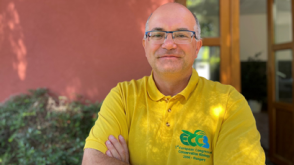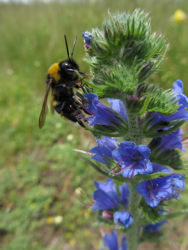
András Báldi ecologist
Today, the issue of biodiversity sustainability is critical. While the majority of the planet’s inhabitants are not necessarily aware of the exact meaning of the word biodiversity, the effects of the decline or disappearance of biodiversity are felt by all. Fortunately, more and more people are recognising that the various services provided by the living world, the ecosystem, are essential to our lives and make our lives better, more comfortable and healthier, and that we humans have to do our best to ensure the sustainability of these services. Pollination is one of the best-known elements of this “service package”, which is what makes fruit trees, for example, bear fruit. In this example, the bees are the service providers, and their work benefits us humans, so it is in our best interest to preserve the biodiversity of bee species: the more pollinating bee species we have, the more efficient and extensive pollination will be. Clean air is another service of the ecosystem, for which the diversity of plants and the maintenance of this diversity is also essential. The same goes to clean water. Biodiversity is quite simply essential for humanity to live a physically and mentally healthy life on the planet. Unfortunately, current trends are not going in this direction, with biodiversity in many species rapidly diminishing or disappearing. The countries with the most advanced industries around the world have been at the forefront of this destruction. More and more people have now recognised the need to intervene, to slow down and reverse negative trends, as biodiversity is humanity’s invaluable natural capital and the key to its long-term survival. If this natural capital is depleted, humanity will also “go bankrupt”, so preserving diversity is vital without exaggeration. One of the explicit objectives of the Biodiversa+ partnership is to develop new solutions, processes and strategies for biodiversity conservation and to acquire new knowledge leading to future solutions. Our research is not conducted in an ivory tower, but with broad stakeholder involvement, in a transparent way, and in accordance with the principles of Open Science, guaranteed by the non-research members of the Advisory Board and the institutions they represent.

The more pollinating bee species we have, the more efficient and extensive pollination will be
The Biodiversa+ partnership is mainly funded by Member States and EU contributions. The 7-year programme, which will run from 2021 to 2027, has a total planned budget of more than EUR 800 million. Hungary did not previously participate in the EU initiatives that preceded the partnership, but the National Research, Development and Innovation Office is now representing Hungary in Biodiversa+, and Hungary will contribute EUR 2 million to the research over seven years. Thanks to the funding, Hungarian research groups have also been given the opportunity to submit proposals to the transnational calls, and they seem to have done so with great enthusiasm. As a full member of the partnership, Hungarian researchers have more room for manoeuvre than before and are also surprisingly active, which is why a Hungarian researcher was invited to chair the twelve-member Scientific Advisory Board of Biodiversa+ (six scientists and six non-scientists, representing the more than half a hundred institutions involved in the work of the partnership). András Báldi’s election is a significant step forward for Hungary and for Central and Eastern Europe as a whole, as the countries of our region are typically under-represented in EU-level scientific research programmes (both in terms of leadership and project participation and coordination).
I was happy to take up the invitation, and fortunately all the members of the board are very active and competent, so we are making good progress. I will serve as chair until 2025, halfway through the programme period. My current involvement is not without precedent. As a researcher I have regularly participated and continue to participate in the Intergovernmental Platform on Biodiversity and Ecosystem Services (IPBES - Intergovernmental Science-policy Platform on Biodiversity and Ecosystem Services). The high level of Hungarian activity certainly played a role in the invitation from the partnership. The main task of the Advisory Board is to provide the Assembly, which is composed of organisations responsible for research policy and biodiversity policy in the Member States participating in the Partnership, with regular and relevant scientific advice to facilitate its decision-making, including on the Partnership’s research agenda, annual work programme, and evaluation of funded projects and the work carried out by the Partnership. The role of the Advisory Board is therefore far from being nominal, on the contrary, it is very practical and will therefore influence the direction of the Biodiversa+ partnership and its adaptation to the current scientific, social and economic context. Working together in synergy will provide an opportunity to stimulate dialogue between scientific experts and policy makers, as a prerequisite for finding effective responses to the serious challenges facing our environment. In the domestic arena, too, as researchers we are only satisfied if our proposals are taken on board by decision-makers, which is why we at the Ecological Research Centre are not afraid to use open research, so we have indeed laid all our cards on the table. For example, we will investigate the diversity of bee species and the reasons for the loss of diversity. We share our findings with policy makers, especially the Ministry of Agriculture, for example on where and how many wildflower plots we propose to plant in order to “attract” pollinating bees to a particular area and thus establish stable bee populations in the area. We have recognised, for example, that wildflower beds need to be at least 50 metres wide, rather than the 3-5 metres wide most commonly used, in order to make the area a permanently attractive habitat for pollinating bees, simply so that they like to live there, return and pollinate again and again in the wider surroundings. At the expert level, our proposal has already been accepted by decision-makers, so there is every chance that flowerbeds will soon be planted according to our recommendation. The importance of bees for biodiversity conservation is quite high and people would not miss honey in their homes in the first place if these tiny, industrious insects could not perform their ecological service. The survival and pollination of bees is a food security issue, as many crops (sunflowers, tomatoes, coffee, fruit, etc.) require them. There are around 700 bee species in Hungary, we are a bee superpower in Europe, so to speak, and it is important to preserve this. This high figure reflects the favourable state of the domestic environment, at least in some regions. In the Netherlands, for example, the grasslands are largely replanted with few wildflowers, and only a few bee species can survive in this environment. So, humanity’s ecological capital is indeed dwindling, but in partnership with Biodiversa+ we are working to put this declining capital back on the upward trajectory. We need to take this seriously so that future generations can have access to the ecosystem services that are still readily or relatively easily available today - and thus to our morning coffee, fruit, honey, etc.
In the first application period of the Biodiversa+ partnership, 2021/2022, more than twenty applications with domestic participation were received, including seven Hungarian-led project proposals, which indicates a significant increase compared to previous international activity. The Hungarian role and research work in Biodiversa+ could be a stepping stone to future Horizon Europe calls, which are larger in terms of consortium size and budget compared to the partnership calls, as active participation can stimulate the international publication activities of Hungarian researchers, and successful coordination can help to enhance the role of Hungary.






